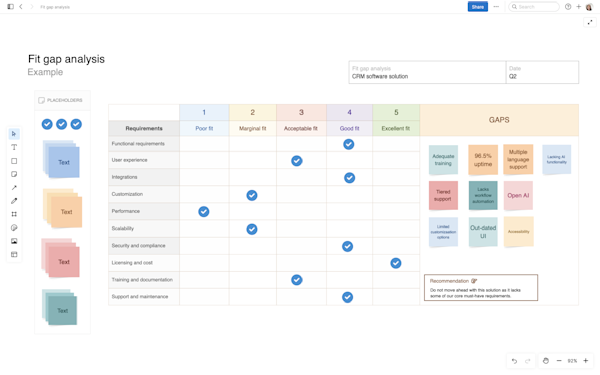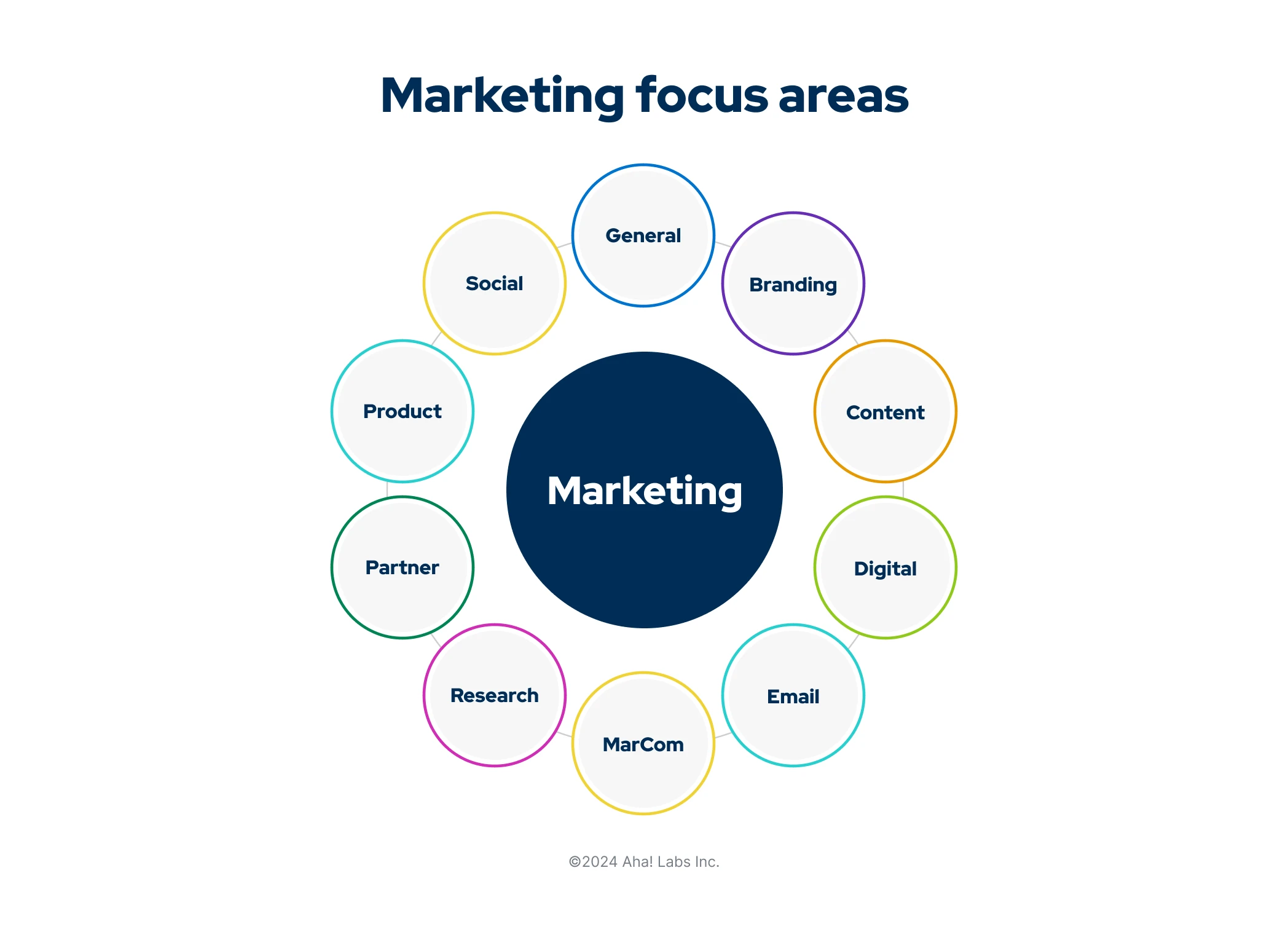General marketing job titles
Most professionals that hold various marketing job titles have been generalists at some point, planning and overseeing a variety of marketing activities. They are often referred to as marketing managers. This role is common at smaller companies or midsize organizations with more limited resources. After all, a generalist performs tasks that might otherwise be spread across several specialists at a larger, more complex company.
A marketing generalist does it all: They manage email marketing campaigns, plan and build content, craft product announcements, and maintain relevant social media accounts. This role also represents marketing at cross-functional team meetings, supports the sales team, and measures the success of various marketing methods.
Senior-level marketing leaders can also be grouped under general marketing. For example, the CMO (or Chief Marketing Officer) reports directly to the CEO or COO and is responsible for all marketing activities within a company. This includes promoting the company's brand as well as the products and/or services it produces. CMOs must have a thorough understanding of market trends and work with other executives and the board to create a bold vision for the future.
Under the CMO is often a VP of marketing who works across multiple teams and departments to ensure that everyone is aligned toward the same strategic goals. They are adept at uniting cross-functional teams under a common purpose and work with other executives to develop a marketing strategy with measurable outcomes. Depending on the size of the company, there might also be various director-level marketing job titles as well.
Some common job titles for marketing generalists include:
Related:
Brand marketing job titles
A company's brand is its identity. Branding is more than just logos, color schemes, and fonts — it involves every quality that a customer associates with a company. For example, if a customer associates a company with intuitive design or personable service, they are more likely to seek out that company's products (and try any new products that company might release in the future).
A brand marketer's job is to ensure that the company and its products are associated with the right message. The goal? Convert prospective customers to actual customers, and turn customers into brand advocates who will identify with the company and act as a megaphone to share the brand's message.
Some common job titles for brand management marketers include:
Content marketing job titles
Content marketing is at the core of inbound marketing. It is a content marketer's job to create a variety of media, including blog posts, videos, podcasts, newsletters, and landing pages. Content marketers must reinforce information about the product or service that is geared toward the target audience. So a content marketer must understand who they are creating content for, the types of messages that audience will be most receptive to, and what mediums will be most effective.
On a day-to-day basis, content marketers build and manage an editorial calendar that delivers content aligned with the company's objectives and business goals. They ensure that all content is on brand — in terms of style, quality, and tone — and they optimize the content for search engines and social promotion. The content marketing manager is also responsible for tracking their content marketing plan's performance. At the management level, some content marketers manage creative resources and folks as well, including designers and writers.
Some common job titles for content marketers include:
Content director
Content manager
Content marketing analyst
Content marketing coordinator
Content marketing manager
Content marketing producer
Content specialist
Content strategist
Content writer
Editorial director
SEO content manager
Social media content coordinator
Related:
Digital marketing job titles
At its simplest, digital marketing encompasses any marketing effort that exists online. Digital channels include search engines, social media, company websites, blogs, and online advertisements. Because so many people spend much of their time online, it is rare to find a modern marketer today whose role does not involve digital marketing in some capacity.
Digital marketers, however, specialize in these channels. They are data experts and excel at monitoring fast-paced insights, including real-time campaign analytics. They craft digital marketing plans, design content to fit each digital channel, and constantly monitor the results to measure the efficacy of each campaign. Content and product marketers depend on digital marketers for performance insights, and marketing managers depend on them to measure the success of programs.
Some common job titles for digital marketers include:
Digital marketing analyst
Digital marketing manager
Digital strategist
Director of digital marketing
Director of web marketing
Director of SEO operations
Internet marketing specialist
Marketing automation manager
Paid search manager
PPC manager
SEM manager
SEM specialist
SEO manager
SEO specialist
SEO strategist
Web marketing manager
Web marketing specialist
Email marketing job titles
With email marketing, a company can tailor its message to existing and potential customers. This message might be as simple as a coupon code, product announcement, or monthly newsletter. At a deeper level, however, the email marketer is responsible for establishing an ongoing relationship between the company and its audience.
Email marketers need to work cross-functionally with every other marketing team member to make sure the email strategy is consistent with the organization's overall messaging. This work relies heavily on data, as email marketers need to closely monitor analytics related to email performance, audience segmentation, and A/B tests.
Email marketers must also be proficient in campaign automation. At some companies, email marketers might write and design the emails themselves. Others might partner with a content or design team. At e-commerce companies, email marketers play an especially important role given that their channel has the potential to drive meaningful business.
Some common job titles for email marketers include:
Campaign manager
Demand generation manager
Director of email marketing
E-commerce content specialist
E-commerce marketing analyst
E-commerce marketing director
E-commerce marketing manager
Email developer
Email marketer
Email marketing strategist
Email operations manager
Lifecycle marketing manager
Marketing communications job titles
When the team sets the marketing strategy, marketing communications (sometimes abbreviated as "MarCom") is the team responsible for acting as the megaphone for the company message. Communications marketers work to enhance a company's visibility in the market — to customers, the public, the media, and sometimes investors.
Essentially, this makes the communications manager the voice of the company. They work with designers, writers, and digital marketers to research the audience and create engaging pitches, compile analyst briefings, update their CRM, or talk with advertisers. Public relations is a facet of MarCom as well, which means that the communications manager needs to foster relationships with the press.
Some common job titles for MarCom include:
Analyst relations manager
Analyst relations specialist
Corporate communications assistant
Corporate communications manager
Director of communications
Internal communications manager
Marketing communications manager
Marketing communications specialist
Media relations coordinator
Public relations manager
Publicity assistant
Public relations intern
Marketing research job titles
Market researchers provide insights to other marketers about how to position the right products at the right price to the customers who need them. They plan, design, and implement research campaigns with tools such as user interviews, data analytics, and focus groups. This helps them gather quantitative and qualitative information. In addition to having strong analytical skills, market researchers have the ability to distill large amounts of data into conclusions that their audience can understand and act on.
Some common job titles for market researchers include:
Director of market research
Insights analyst
Market research analyst
Market research interviewer
Marketing data analyst
Product research analyst
Qualitative research assistant
Related:
Partner marketing job titles
Partner marketers seek symbiosis. They use market research to look for collaboration opportunities for two or more brands to promote each other and mutually benefit. Partnerships allow brands to access new audiences, ideally offering a more complete customer experience together than either would separately.
These partnerships can provide a financial incentive (e.g., affiliate marketing) or involve non-financial promotional benefits (e.g., bundling products and services or sharing content).
Partner marketers identify potential partners, work with the partner to establish a relationship, and then collaborate with that partner to design and implement co-marketing campaigns — all while balancing their own company's goals with their partner's needs. They also need to be able to teach their company the value of the partnership and track the ability of the partner program to meet marketing goals.
Some common job titles for partner marketers include:
Affiliate marketing manager
Channel marketing director
Corporate partnership marketing manager
Director of influencer marketing and partnerships
Director of partner marketing
Partner marketing advisor
Partnership marketing director
Partnership marketing coordinator
Product marketing job titles
Product marketing managers thrive in the area between product management and marketing. They need to be experts in the market (including its competitive landscape and buyer personas) and in the product itself. It is the product marketing manager's job to ensure the market understands the value of the company's product and to drive customer demand and adoption.
Product marketing managers are responsible for the go-to-market strategy. They position the product before it launches (or releases new functionality) and work closely with the product team throughout the development process. They also educate sales and support about the product's benefits and how to discuss it with customers.
Some common job titles for product marketers include:
Digital product marketing manager
Director of product marketing
Junior product marketing associate
Junior product marketing manager
Portfolio marketing manager
Product marketing associate
Product marketing manager
Sales enablement manager
Senior product marketing associate
Senior product marketing manager
Solutions marketing manager
Related:
Social media platforms have one thing in common: communities of people who share information. Companies and products play a large role in these social communities, marketing to and interacting directly with existing and potential customers as well as brand advocates and influencers. Social media marketers are experts in this space. They work closely with content and digital teams to design campaigns and social content that will create demand for the product and increase brand awareness.
Social media marketers need to be numbers-savvy — they work with data analytics tools to understand the audience and real-time insights surrounding social activities. At the same time, social media marketers must be highly creative because they collaborate with content and design teams (or do that work themselves) to create social-specific content that will succeed on every channel.
Some common job titles for social media marketers include:
Community manager
Digital communications professional
Digital media director
Director of social media
Director of social media marketing
Engagement coordinator
Engagement manager
Influencer marketing manager
Multimedia communications specialist
Social media editor
Social media manager
Social media marketing manager
Social media strategist
Top
Which marketing titles and roles are most popular right now?
Today's most hired-for marketing titles (according to Indeed) span across specializations and responsibilities. In no certain order, these titles include:
Marketing manager: Oversees marketing strategies and teams, ensuring campaign effectiveness
Product marketing manager: Directs marketing strategies for specific products or services
Digital marketing manager: Focuses on digital channels such as social media, SEO, and content marketing
Content marketing manager: Manages content strategy to engage and attract target audiences
Social media manager: Develops and implements social media plans and strategies
Brand marketing manager: Ensures brand consistency and builds brand awareness
Email marketing manager: Oversees email campaigns, list management, and performance analysis
Event marketing manager: Plans and executes events to promote the brand and generate leads
SEO specialist: Enhances website visibility through SEO
Marketing analyst: Analyzes marketing data to inform strategies and measure campaign performance
This list is definitely diverse, but it shows that the marketing industry is looking for people who can make data-driven decisions and are comfortable with the digital side. You should also welcome collaboration with other marketing teams and cross-functional departments, including product management and sales.
Related:
Top
How to prepare for a marketing interview
OK — you landed an interview for a marketing position. Well done! It is now time to focus on the next phase, which is preparing for the interview itself. Here are a few suggestions to help you start strong:
Research: Examine the company's brand history, campaigns, and programs. Review the job description for details on which marketing tools it uses and which teams you might work with.
Read: Review the company's content across channels to understand its language, style, and personality.
Align: List skills that match the job description and highlight specific past experiences or strengths that align with the organization's goals.
Level up: If possible, take an online course or certification in a marketing area you are less experienced in — especially if it is mentioned in the job description.
Quantify: Prepare examples of your achievements with measurable metrics, such as revenue from campaigns, leads/conversions from programs, or follower growth percentages.
Prepare: Gather questions you have for the interviewer, answers to common marketing interview questions, and a method for taking notes without appearing distracted.
These tips apply whether you are prepping for an in-person marketing role or a remote position. (If it is the latter, we have a few extra pointers.)
Related:




